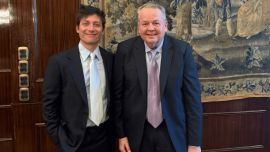The International Monetary Fund confirmed this week it will start talks with the government on a new rescue package in mid-November, while predicting that Argentina’s economy will contract by a staggering 11.8 percent this year.
In a crucial week for the Alberto Fernández administration, a team from the Washington-based crisis lender met with officials in Buenos Aires to discuss the country's challenges amid the coronavirus pandemic, including debt owed to the IMF, and to "exchange views on how best to address them," the Fund said in a statement.
"IMF staff will continue to engage closely with the authorities. Staff plans to return to Buenos Aires in mid-November to initiate discussions on a new IMF-supported programme," the statement said.
A day after that statement, however, Fund officials issued their global growth forecasts for 2020, predicting that Argentina’s economy would contract by 11.8 percent this year, worse than the 9.9 percent it forecast back in June. The news comes as little surprise, given the Fernández administration predicted a 12.1 percent contraction in its recent Budget bill.
The IMF also projected an unemployment rate of 11 percent by the end of the year (it currently stands at 13.1 percent) and 10.1 percent in 2021.
Even prior to the pandemic, Argentina was facing a severe economic crisis despite massive IMF lending in recent years, and the Fund said the Covid-19 crisis exacerbated already high unemployment and poverty rates.
Argentina has been in recession since 2018 and inflation is running over 40 percent. Poverty currently affects 40.9 percent of the population.
Negotiations
The government is hoping to renegotiate repayments on a US$44-billion loan from the IMF in 2018. The credit-line was originally meant to be worth US$57 billion, but Fernández halted disbursements when he took office in December 2019. The first repayments are due in September 2021.
"Argentina is facing complex economic and social difficulties, in the context of an unprecedented health crisis," the IMF said in a statement.
"The deep recession has led to an increase in already-high poverty and unemployment levels, the effects of which are being exacerbated by significant pressures in the FX market.
"These are exceptionally difficult challenges with no easy solutions. A comprehensive set of policies could underpin a restoration of confidence, but will need to be very carefully calibrated to promote the recovery and secure macroeconomic stability."
The Fund's mission team – led by Julie Kozack, IMF deputy director of the Western Hemisphere Department and Luis Cubeddu, mission chief for Argentina – said they "gained a deeper understanding of the authorities' policy plans to stabilise the economy and put it on a more sustainable and inclusive growth path."
The team said it "welcomed the authorities’ commitment to policies to secure a growth-friendly fiscal consolidation while also protecting the most vulnerable, enabling a gradual reduction in inflation, and boosting job creation, investment and exports."
During their five-day visit, Kozack and Cubeddu met with members of the national government, the opposition, business leaders, trade unions representatives and key figures in civil society.
The mission team is due to return to Buenos Aires in November, though no date has yet been specified.
‘Credible and comprehensive’
Speaking at the IMF’s annual meeting on Wednesday, the Fund’s Managing Director Kristalina Georgieva said the government would need "political determination" to overcome the economic crisis.
The "top priority ought to be to put in place a credible and comprehensive economic agenda that balances supporting the economy and people in this difficult time," Georgieva told reporters at the start of the IMF annual meeting.
"We want to be a partner of Argentina. We do count on a political determination to get the country out of what has been historically boom/bust cycles," she said, adding that policymakers must keep "macroeconomic stability in sight."
"Argentina faces very dramatic challenges. The country is in deep recession, social conditions are worsening, economic imbalances are growing," Georgieva said. "We are there for Argentina."
– TIMES/AFP/NA/PERFIL



















Comments